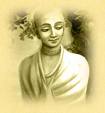‘Ras‘ is something unearthly and beyond the Laws of Nature. Like Brahman, ras is inconceivable and inexpressible. We can only realize ras and cannot arrive at it with logic. Ras transcends all thought-processes and gives us relish when our chitta has attained the state of pure goodness and shines brilliantly.
Those who do not have the desire to relish ras can never realize ras. The author of Sâhitya-Darpan says –
Alankâr-Koustubh says –
“Ras creates magic” and “A feeling of ‘WOW!!’ is the soul of ras; if, after relishing something, we do not say ‘WOW!!’ then it is not ras.”
What do we mean by wonderment? |
Suppose we see something so gorgeous that we have never seen before or we hear something so beautiful that we have never heard before, then we feel a kind of joy and our heart somersaults. Consequently, unknown to us, our eyes too bulge out. This is ‘wonderment’. We call this thrilling experience as ‘ras‘.
Alankâr-Koustubh also states –
“If some favorable objects (or incidents) come together to create such a joyful thrill in the heart, that stupefies our external as well as internal senses – then we can call such a delightful experience as ‘ras’.”
Srila Rupa Goswâmipâd too has written –
“A magical inexpressible relish that shoots across a heart blazing with goodness and is beyond of all human perceptions, it is ‘ras’.” – (B.R.S.2.5.132)
Ras is commonly of two types –
- 1. material ras – we can feel this ras with our heart
- 2. transcendental ras – realized by the soul
When talented writers compose literature about worldly characters then the reader relishes some ras. We call this as ‘material ras‘. The rhetoricians call this as ‘close to relishing Brahman’. However the authors of transcendental ras-literature flatly denounce this and state – “The ras in material literature target the heart of material people, hence it is full of Mâyâ (illusion) and contains the three gunas (modes of nature). Naturally it is short-living. There is no way we can gain complete bliss from this ras.“
Srimat Jiva Goswâmipâd has clearly written in Priti-Sandarbha (110) –
“Worldly passion can give only slight pleasure, since if we analyze deeply, material emotions ultimately result in sorrow. Therefore we cannot respect material literature that gives rise to worldly ras.“
Srila Kabi Karnapur’s opinion is –
“Ras is of three types –
- prâkrita (material) e.g. the ras found in the novel ‘Mâlati and Mâdhav1‘
- aprâkrita (transcendental) e.g. the ras reposing in Sri Râdhâ-Krishna
- âbhâs (shadow of ras) e.g. ras existing in an inappropriate place or situation”
Srila Vishwanâth Chakravartipâd has explained this statement as follows –
“We classify ras into three types and say that material ras is a type of ras just to satisfy the fans of material literature. Actually there is no relish in material novels. Those who think that worldly events can arouse ras, they are mistaken. It is certain that mundane heroes and heroines will result in either ash, worms or stool – then how can we get ras in them? Also when we analyze the truth we see that that the worldly poets are so ignorant that they present their heroes and heroines as ‘beautiful like flowers, youthful and fragrant’. Such falsehoods only fuel our hatred all the more than arousing ras. This is the reason why the author (Srila Kabi Karnapur) who is a rasik has not cited a single poem composed by material poets as examples; rather everywhere he has only described transcendental ras and has given likewise examples. Those who have had the good fortune to relish blissful transcendental divine ras, find material ras as worthless and horrible. But of course, material literature offers more happiness than the pleasures of the flesh. We do not doubt this fact.
(to be continued)
1 A famous book based on material lovers

